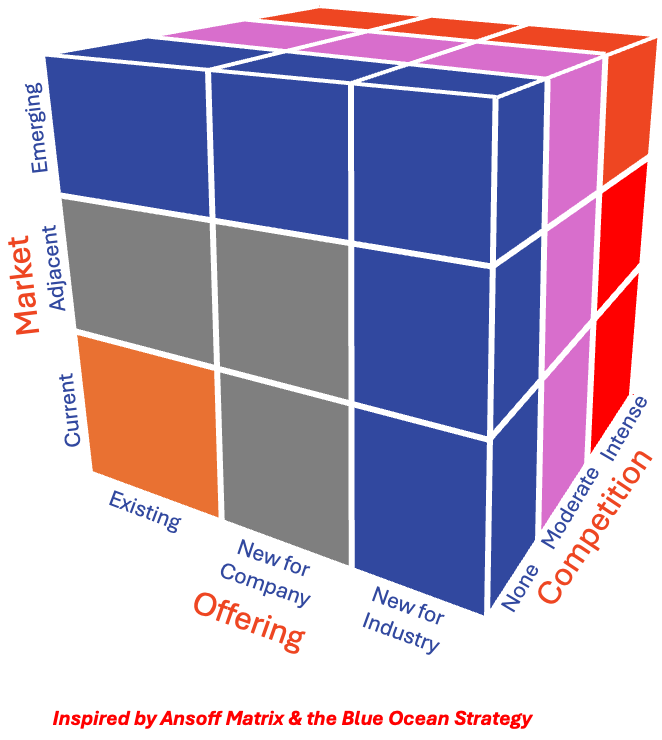Cultivating strategic thinking for your Service Transformation
In a dynamic business landscape like in services for manufacturing companies, strategic thinking is a necessity. Cultivating this skill across all...
6 min read
Jan van Veen
Dec 1, 2023 4:30:41 PM

One of the key challenges confronting manufacturers today, as they embark on their service transformation journey, is building strong service leadership and innovation teams for the required service strategy management.
One of the key challenges confronting manufacturers today, as they embark on their service transformation journey, is building strong service leadership and innovation teams for the required service strategy management.
This critical step is fundamental in strategizing and driving the pace of transformation in the service sector. These teams not only steer the direction of change but also embody the innovative spirit and resilience needed to navigate the complex dynamics of the ongoing and accelerating service transformation.
The backdrop of this transformational journey is a manufacturing world caught in a whirlwind of rapid innovation, digital disruption, and a heightened focus on sustainability. These factors are not just redefining product manufacturing; they are revolutionizing service lines, elevating them from operational functions to core strategic business ventures. In this fast-evolving scenario, the agility and foresight of service leadership teams become invaluable in adapting to and capitalizing on these changes.
Effective strategy management is at the heart of this transformation. It involves a nuanced understanding of market trends, customer expectations, and competitive pressures. For manufacturers, it's no longer about just keeping pace but rather about anticipating, innovating, and leading the industry's evolution. This article aims to explore how manufacturers can navigate these challenges, turning their service lines into strategic assets through adept leadership and innovative team dynamics, thus securing a competitive edge in the future landscape of the industry.
In the rapidly evolving landscape of manufacturing, the stakes for companies are high, and they are distinctly polarized between those who adapt and those who lag behind. This dichotomy not only shapes the present but also casts a long shadow over the future of businesses in this sector.
For those manufacturers who fail to adapt to the new paradigms of service transformation, the risks are multi-faceted and significant. Primarily, they face the danger of missed opportunities. As the market evolves, new niches and demands emerge, but without a proactive approach, these chances for expansion and growth are often lost. Additionally, there's a palpable decline in stakeholder confidence. Investors, partners, and even internal stakeholders lose faith in the company's ability to stay relevant and competitive, leading to a potential decrease in investment and support. Another critical risk is the struggle to attract and retain talent. In an industry increasingly driven by innovation and adaptability, top talents gravitate towards organizations that are seen as leaders and pioneers. Thus, companies resistant to change often find themselves grappling with a talent deficit, further impeding their ability to compete and innovate.
Conversely, the companies that embrace change and lead the charge in service transformation stand to gain substantially. These frontrunners often experience accelerated growth by capitalizing on new market opportunities and adapting swiftly to changing customer needs. Their forward-thinking approach earns them the trust and satisfaction of their customers, reinforcing their market position. Another significant advantage is the ability to attract and retain top-tier talent and investors. As these companies are perceived as industry leaders and innovators, they naturally attract individuals and entities that want to be associated with success and forward momentum. Additionally, these companies tend to have a more profound strategic commitment from their teams, which translates into higher productivity and innovation. This not only drives their current success but also sets a solid foundation for future growth and adaptation.
The cornerstone of thriving in the ever-competitive manufacturing industry is the formulation of winning service strategies. This process begins with setting a clear, inspiring vision and mission that resonates deeply with both teams and stakeholders. A compelling vision serves as a north star, guiding every aspect of the organization's journey, while a well-defined mission articulates the organization's purpose, aligning efforts and decisions towards common goals. Together, they create a cohesive narrative that not only drives internal motivation but also fosters a strong connection with external stakeholders.
The next crucial step is the formulation of these strategies with utmost clarity and focus. Clear service transformation strategies eliminate ambiguity, enabling teams to focus their efforts and resources effectively. This clarity also facilitates better communication within the organization and with external stakeholders, ensuring everyone is aligned with the company's direction and objectives.
Strategic thinking for insights is another vital element in crafting winning service strategies. In an industry teeming with competition and rapid changes, generic strategies based on common knowledge are no longer sufficient. Organizations must delve deeper, seeking unique insights that can lead to true differentiation. This involves a rigorous analysis of market data, customer feedback, and competitive landscapes.
By basing strategies on these differentiated insights, companies can create more tailored, impactful service offerings.
Furthermore, these insights play a crucial role in gaining buy-in from stakeholders. When stakeholders see that strategies are built on solid, unique insights rather than assumptions or generic trends, their trust and commitment to the organization’s vision increase significantly. With an ongoing strategic dialogue with your stakeholders, you prepare the buying for your next service strategy.
Executing service transformation strategies effectively is a critical aspect of ensuring their success. One of the most common pitfalls in this phase is the lack of agility and ownership among teams. In a rapidly changing market, strategies need to be flexible enough to adapt to new information and circumstances. This agility must be coupled with a sense of ownership, where every team member feels personally invested in the success of the strategy. This involves clear communication of roles and expectations, as well as creating an environment where feedback and ideas are welcomed and acted upon.
Another key aspect of successful strategy execution is managing stakeholders effectively. Stakeholders, both internal and external, have varying expectations and concerns regarding the transformation process. Effective management involves regular and transparent communication about the progress and changes in the strategy. It's also about understanding and addressing their concerns proactively. For instance, customers might be apprehensive about changes in service delivery, while employees might be concerned about new roles or processes. Addressing these concerns head-on helps in maintaining stakeholder trust and support throughout the transformation journey.
Maintaining a growth mindset is essential throughout the transformation process. This mindset encourages continuous learning, resilience, and the willingness to embrace challenges and changes. It's about seeing setbacks not as failures but as opportunities to learn and improve. A growth mindset fosters an organizational culture where innovation is encouraged, and risks are viewed as necessary steps towards improvement. It also plays a crucial role in keeping the team motivated and engaged, even when facing obstacles.
In summary, the successful execution and management of service transformation strategies require a balanced approach that incorporates agility, ownership, effective stakeholder management, and a growth mindset. By focusing on these elements, manufacturers can ensure that their strategies are not only well-conceived but also effectively implemented, leading to sustained growth and success in the competitive manufacturing industry.
The journey to transform services in the manufacturing industry heavily relies on the capability and engagement of service leadership and innovation teams. However, building such teams is easier said than done.
To address these challenges, a multi-faceted approach to team building is essential.
One effective strategy is embracing the philosophy of 'learning by doing.' This hands-on approach not only accelerates skill development but also encourages a culture of experimentation and adaptability. Teams learn to respond swiftly to challenges and adapt their strategies in real time, a critical skill in the ever-evolving manufacturing sector.
Judicious decision-making in outsourcing versus in-house development is another critical strategy. While leveraging consultants can bring in specialized expertise for certain tasks, it's crucial to discern which capabilities and activities are essential to keep in-house. This balance ensures that the core strategic expertise and critical functions of strategy management remain internal, preserving organizational integrity and fostering a more sustainable, self-sufficient team development.
Recruiting from a variety of industries can bring fresh perspectives and innovative approaches to problem-solving. This diversity enriches the team's collective knowledge and enhances creativity.
Finally, continuous development is vital. Investing in regular training and development ensures that teams remain up-to-date with the latest trends and technologies, fostering a culture of continuous learning and improvement.
As companies navigate the complexities of service transformation in the manufacturing industry, moreMomentum emerges as a pivotal ally. Our Service Community is dedicated to guiding service leadership and innovation teams through their transformation journeys, providing tailored support and resources that address the unique challenges of this sector.
At the heart of our offerings are our community meetings, designed to foster a collaborative environment for sharing insights and experiences. Our Peer Group Meetings offer a platform for professionals to engage in deep discussions and exchange best practices. The monthly Executive Service Roundtables serve as a hub for service leaders to explore new strategies and discuss industry trends. Additionally, our focused Service Transformation Summits bring together experts and thought leaders, providing an immersive experience in the latest developments and innovations in service transformation.
The Global Service Transformation Monitor is another key facet of our services. This resource keeps your team abreast of global trends, benchmarks, and best practices in service transformation. It offers valuable data and insights, enabling your team to make informed decisions and stay ahead in the competitive landscape.
Our Service Transformation Academy offers specialized workshops on critical topics. These sessions are designed to equip service leaders and their teams with practical skills and knowledge, enhancing their capabilities in strategy formulation, execution, and management. The workshops also emphasize the development of a growth mindset and innovative thinking, crucial for adapting to the ever-evolving demands of the industry.
In summary, moreMomentum's comprehensive suite of services and resources is strictly crafted to empower manufacturers in their service transformation journey. From collaborative community meetings to in-depth educational programs, we are committed to helping you maintain a winning pace in the dynamic world of manufacturing.
In conclusion, the journey of service transformation in manufacturing demands effective strategy management, agile execution, and the development of capable leadership and innovation teams.
moreMomentum stands ready to assist in this journey, offering a unique blend of community meetings, insightful global monitors, and specialized training through our Service Transformation Academy. Our services are designed to empower your teams, providing the tools and knowledge necessary to navigate and lead in this dynamic landscape.
Subscribe for the our Impulse Letter
With regular updates about service news, trends and best practices.

In a dynamic business landscape like in services for manufacturing companies, strategic thinking is a necessity. Cultivating this skill across all...

Strategic focus in service transformation demands good alignment of global teams and stakeholders. This promotes agility in strategy execution and...

To achieve sustained growth, service leaders must go beyond common trends and develop strategies rooted in structured growth patterns, unique...